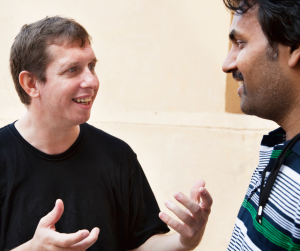“We need to redefine what masculinity is” – in conversation with Jon Metcalfe – Pt. 2
Tuesday, November 19th is International Men’s Day.
We’re marking the occasion with part 2 of our conversation with YMCA Together’s Deputy Chief Executive Jon Metcalfe, as he discusses men’s mental health, masculinity, and the importance of asking for help.
Read Part 1 here.
Why are men more likely to experience poor mental health?
One of the leading causes of men’s poor mental health is the lack of targeted approaches and support. Although support is better now and moving in the right direction, it’s still not there. We still see men with really poor mental health. Suicide remains the biggest killer of men under 50. Suicide victims are 75% more likely to be men.
These figures are proof that men don’t get the mental health support that they need at the appropriate times. Poor mental health often leads to not being able to keep up a home or manage a tenancy, which can lead to homelessness. Poor mental health is one of the driving reasons why more men experience homelessness than other genders.
Is our perception of masculinity a factor in men’s mental health problems?

We need to start redefining what masculinity is. For me, masculinity is being a fully evolved human being who can acknowledge and understand their feelings. It’s seeing that the biggest sign of strength is admitting your weaknesses and when you’re feeling down. It’s saying, “I’ve got problems.” We reach our highest level of well-being when we look inside ourselves, see where we can improve, and then try to improve rather than putting the mask on. I’ve done it myself. You put the mask on, paint the smile, and carry on as if everything were okay. It’s hard to keep that going for a long time. So the best thing to do is to soften and realise that help is available. Talking is the first part of it. We can improve our mental health and well-being by being honest with ourselves.
There have been generations of “boys don’t cry” and these types of things we’re often told growing up. But we need to be moving past this now. As we go through generations, it’s about bringing up our kids and influencing younger people to be honest about their feelings. You don’t have to be the tough guy. The strongest people can admit they’re feeling vulnerable, talk about it and start the journey to improve how they’re feeling.
We can’t ignore the damage that men cause in society – the levels of violence particularly against women and girls is unacceptable. It’s disgraceful and it has to stop. Perhaps the first step towards bringing up boys and young men differently is to not encourage them to hide emotions, as these feelings often reappear as anger and lead to violence. So, as society, as men, we need to in the first instance take a stand against violence against women and girls, and see how we can learn to better manage our emotions and never see violence or controlling others as an option. If we’re feeling levels of anger that could lead to violence or abuse, talk to someone who can help us explore those feelings and find healthier ways of regulating ourselves.
It’s these same repressed emotions and the inability to talk about our problems and difficulty relating to ourselves and other people in a healthy way that I believe leads to such high numbers of men taking their own lives. Whenwe can’t see any other way or any other options – when we believe the world will be a better place without us – its a desperate place to be. I really hope that we can get people who feel this way to know their value, to be able to ask for and accept help, to know that they do matter and that there is always someone who’ll listen to them. Its never too late to learn how to care for and love yourself more and there are always people who will listen and travel with them through a journey to a more balanced life.
How can we improve men’s mental health?
We’ve got to start the conversation and keep having it. Men’s mental health can’t be a taboo subject or something we’re afraid to talk about. We can acknowledge that it’s okay not to be okay. Asking for help isn’t a sign of weakness; it’s a sign of strength. YMCA Together talks about strength as asking for help when you need it. Unfortunately, men don’t do that enough.
So we encourage that within our teams, who then encourage the people we support to create an environment where it’s okay to ask for help, acknowledge that you’re not feeling great, and say that you need to talk to someone. It’s about starting a conversation and keeping a conversation going.
Kindness is important, too. It’s something that’s talked about a lot, but can we put it into action? Can we do something to help another person? Can we lift them up a little bit? Even if it’s just making a cup of tea for someone, sitting down with them and making yourself available for a chat.
This isn’t a YMCA issue or something we can fix alone – it’s a societal issue.
Why can’t we encourage all men to sit down, take a breath, think about themselves, think about how they’re feeling and express themselves by talking to each other? Some of the work we do focuses specifically on men, like our walking groups, are about getting out and talking. It doesn’t have to be about the football or what you did last night. Why can’t we talk about feelings? We try to facilitate and encourage men to be more open to their feelings.
What does success look like for someone who has experienced poor mental health?

Success is hard to define because everyone’s on an individual journey through life. But when we can reach our authentic selves and see our strengths and weakness, I see that as success. We’ve all got assets, but we often focus on what’s ‘strong’ rather than what’s wrong. Success is looking at what’s wrong and trying to work and build on that too.
When you know your authentic self and how you respond to things, you’ll understand that there are different ways of responding. You’ll accept who you are and put coping strategies in place. We’ll know the things that trigger us. We’ll know how we responded in the past and see opportunities to react differently. Success is being on a journey to more self-awareness and making choices that are right for you.
Once you’ve got those parts in place – we relate better to ourselves and others. Then we’ve got the foundations to step out of things like homelessness. We can manage ourselves and our lives in a much more healthy way. Success, to me, is having more control over your life and making more positive choices about your future.
___________
